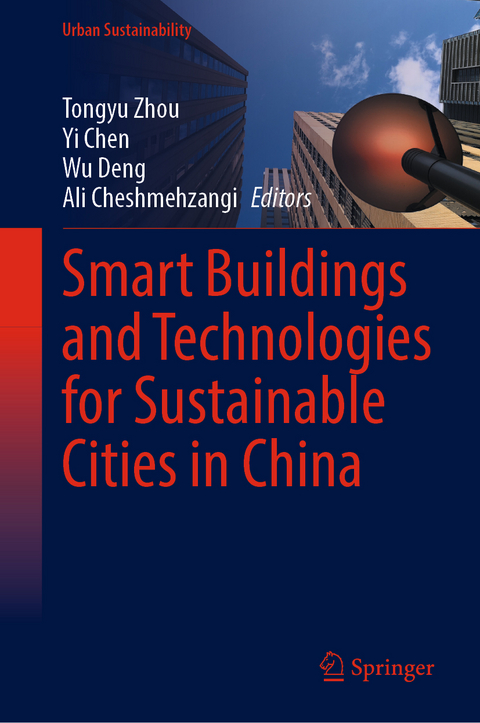
Smart Buildings and Technologies for Sustainable Cities in China
Springer Verlag, Singapore
978-981-99-6390-4 (ISBN)
Dr. Tongyu Zhou is Assistant Professor in Building Services Engineering and Building Physics at the University of Nottingham Ningbo China. He has a Ph.D. degree in Sustainable Energy and Building Technologies from the University of Nottingham. He is Member of the China Green Building Council and WELL AP. His research interests are mainly focused on low carbon buildings, smart buildings, thermal energy storage systems, building energy simulation, and human comfort in buildings. Prof. Yi Chen is Full Professor of the College of Architecture and Urban Planning of Tongji University. He is National License Architect of P. R. China, Visiting Professor of Pavia University Italy, Council Member of the Architectural Society of Shanghai, and Member of the Environmental Art Design Committee of China Artists Association. Over the years, he has been engaged in the design and study of ecological architecture as well as interior and exterior environmental design, involved in some major research programs. Dr. Wu Deng is Associate Professor in Sustainable Architecture at the University of Nottingham Ningbo China. He is Director of Center for Sustainable Energy Technologies and Head of Sustainable Built Environment Research Group in the university. He is Certified Passive House Designer. His research interests are mainly focused on low carbon buildings and sustainable eco-city planning. Prof. Ali Cheshmehzangi is Full Professor of Architecture and Urban Design with a Ph.D. degree in Architecture and Urban Design, a master’s degree in Urban Design, a graduate certificate in Professional Studies in Architecture, and a bachelor’s degree in Architecture. So far, Ali has +125 published journal papers and 10 other published books, titled ‘Designing Cooler Cities’ (2017), the award-winning ‘Eco-development in China’ (2018), ‘Sustainable Urban Development in the Age of Climate Change’ (2019), ‘Identity of Citiesand City of Identities’ (2020), the award-winning ‘The City in Need’ (2020), ‘Urban Memory in City Transitions’ (2021), ‘China’s Sustainability Transition’ (2021), ‘Sustainable Urbanism in China’ (2021), ‘Urban Health, Sustainability, and Peace’ (2021), and ‘Green Infrastructure in Chinese Cities’ (2022).
Chapter 1. Introduction and editorial to the book. Tongyu Zhou.- Part 1. Reviews and insights into smart and sustainable nexus in building and cities.- Chapter 2. Climate change and building carbon emissions in China.- Chapter 3. Technologies for smart sustainable cities and intelligent buildings.- Chapter 4. Data Anonymization and Open Sharing are Key to a Sustainable Built Environment.- Chapter 5. Revisit thermal comfort theories for sustainable buildings.- Part 2. Advanced technologies for sustainable buildings and cities.- Chapter 6. Modeling of Building System Operational Faults for Improved Energy Efficiency.- Chapter 7. Framework for the development of a smart urban heat adaptation decision-making system for sustainable and resilient communities.- Chapter 8. Smart heating in centralized urban heating systems.- Chapter 9. Comparative study of a compact thermal absorber based photovoltaic/thermal (PV/T) system against conventional photovoltaic (PV) system.- Chapter 10. Energy simulation based and assisted smart HVAC control for energy efficiency.- Chapter 11. Human Behaviour and the Stochastic Movable Shading Model in Office Buildings.- Part 3. Case Studies.- Chapter 12. The sustainable strategy and application in commercial complex in Shanghai.- Chapter 13. A case study of real-time chiller optimization in the manufacturing industry with data-driven load forecast.- Chapter 14. The application of BIM technologies in smart campus management.
| Erscheinungsdatum | 12.10.2023 |
|---|---|
| Reihe/Serie | Urban Sustainability |
| Zusatzinfo | 42 Illustrations, color; 8 Illustrations, black and white; XVIII, 161 p. 50 illus., 42 illus. in color. |
| Verlagsort | Singapore |
| Sprache | englisch |
| Maße | 155 x 235 mm |
| Themenwelt | Naturwissenschaften ► Biologie ► Ökologie / Naturschutz |
| Sozialwissenschaften ► Politik / Verwaltung ► Staat / Verwaltung | |
| Technik ► Architektur | |
| Technik ► Elektrotechnik / Energietechnik | |
| Schlagworte | Building Energy Simulation • Carbon neutrality • Digital technologies • Low Carbon Buildings • renewable energy • Smart Buildings • Smart Heating Systems • Sustainable Built Environment • sustainable cities |
| ISBN-10 | 981-99-6390-7 / 9819963907 |
| ISBN-13 | 978-981-99-6390-4 / 9789819963904 |
| Zustand | Neuware |
| Haben Sie eine Frage zum Produkt? |
aus dem Bereich


